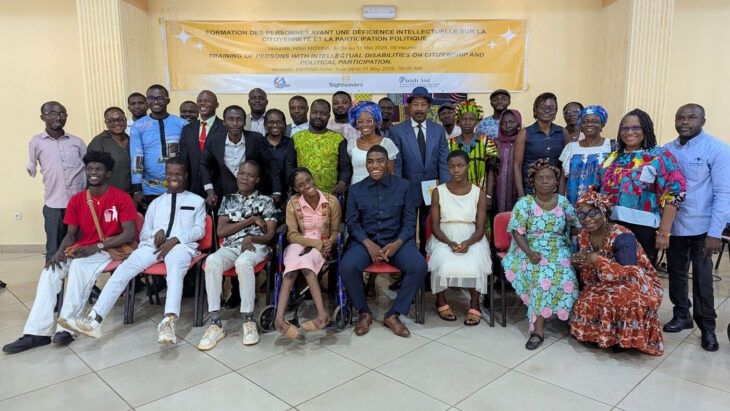Blog
Closing the Citizenship and Political Participation project
- Inclusive participation & citizenship
- Africa
In Cameroon, people with intellectual disabilities are often shut out of political life.
They are left out of decisions that affect their lives, excluded from elections, and ignored in development planning. Their right to take part in political life is often not recognised or supported.
We worked on a project to change that.

The Citizenship and Political Participation project focused on making sure people with intellectual disabilities in Cameroon can take part in politics and be recognised as full citizens.
The project was led by Sightsavers. Inclusion International supported it by sharing knowledge and experience from our global network. We also worked closely with Inclusion Africa and our member La Chrysalide from Benin.
Sightsavers have also written about the project and its impact on their own work. Their blog reflects on what the international development sector needs to do to be more inclusive of people with intellectual disabilities. You can read it here.
The project ran for 2 years, from 2023 until 2025. The project ended in July 2025.
What did we do on this project?
We worked with Sightsavers to make sure people with intellectual disabilities can take part in politics.
We also worked with Inclusion Africa and La Chrysalide, an Inclusion International member from Benin.
During this project:
- We trained future self-advocate leaders to lead workshops about the right to political participation and good support
- We held focus groups with people with intellectual disabilities and caregivers to learn about their experiences taking part in politics, led by self-advocate leaders
- We brought together self-advocates, supporters, government officials and representatives of civil society organisations at training workshops to promote meaningful inclusion of people with intellectual disabilities in politics
We also created easy-to-understand resources about making decisions, taking part in elections and being part of development work.
- Our Right to Vote – Guide
- Taking Part in Decision-Making – Guide
- How to Take Part in Elections – Guide
- How to Take Part in Local Development Projects – Guide
What was the impact of this project?
As part of this project, people with intellectual disabilities learnt about their right to participate in politics and how to advocate for this right, while family members learnt how they can support them in speaking up and taking part in political life.
I didn’t know that children “like that” could go out, go to school, speak and educate people. My daughter has never left the house, I didn’t know she had rights.
– Parent of a self-advocate after attending the training for self-advocate leaders.
Furthermore, during this project, key stakeholders from government and civil society worked alongside people with intellectual disabilities to develop strategies for their meaningful inclusion in politics and development work.
Political participation is an issue that is very important to our network. People with intellectual disabilities have the right to be fully included in their communities. Taking part in decisions, through voting and being involved in groups like Organisations of Persons with Disabilities (OPDs), is an important part of that inclusion.
Beyond this project, self-advocate leaders who received training will continue to promote the meaningful engagement of people with intellectual disabilities in decision making processes in Cameroon.
From now on I will no longer be afraid to speak in public, I will tell everyone that I have rights.
– Self-advocate after attending the training for self-advocate leaders.